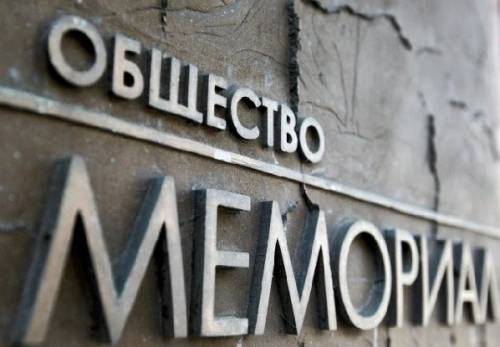Memorial Society declared ‘foreign agent’ for criticizing Russia’s military aggression in Ukraine

In the latest move in its mounting offensive against civil society in Russia, the Justice Ministry has declared the renowned International Memorial Society a ‘foreign agent’. The four grounds cited include the fact that Memorial had publicly called Russia’s actions in the East of Ukraine military aggression.
The Justice Ministry’s decision was not unexpected, following an unscheduled check announced at the beginning of September. It is, however, illegal and flies in the face of a Constitutional Court decision stating clearly that NGOs registered as international cannot be ‘foreign agents’.
Memorial will be appealing against the decision. The main grounds must be the position taken by the Constitutional Court, however the things which the Justice Ministry said it had ‘uncovered’ also do not withstand scrutiny. According to Alexandra Polivanova from Memorial, there were four such points noted.
Memorial has publicly criticized the Law on ‘Foreign Agents’, as well as the decision to forcibly add the Andrei Sakharov Centre to the list; Memorial’s public identification of Russia’s actions in eastern Ukraine as military aggression; and a public statement attributing responsibility for the killing of Kremlin critic Boris Nemtsov to the regime.
Polivanova writes: “What can I say, I’m happy to work at Memorial and am proud of each of those four public statements.
In fact if you look at the Justice Ministry’s register of foreign agents, you find good news. Look at that list of 144 organizations – there is civil society in Russia. “
There could be other reasons as well. Memorial has played a vital role in helping to name and ‘rehabilitate’ the victims of Soviet crimes, especially under Joseph Stalin. During Vladimir Putin’s rule, there has been a steady move towards whitewashing the bloody dictator and saying as little as possible about his victims. Memorial recently published a database of those directly implicated in implementing the Terror, which is also likely to have antagonized those in power.
The announced check on Memorial coincided with inclusion on the register of the Levada Centre, Russia’s main independent pollster. The Levada Centre had just reported a major slump in support for the ruling United Russia Party, and had a few months earlier reported a 10% drop in Putin’s popularity. In July, it had investigated the public’s attitude to the Bolotnaya Square prosecutions after protests over Putin’s third term as president and found that 54% of respondents viewed the case as fabricated in order to deter people from protesting.
Memorial – the International Memorial Society, as well as some linked organizations like the Memorial Human Rights Centre – have all been under fire for a long time.
In Oct 2014, the Justice Ministry applied to the Supreme Court to get Memorial dissolved, but then in January of the following year withdrew its application.
In an interview to Radio Svoboda after the latest check was announced, Alexander Cherkasov, Head of the Board of Memorial, pointed to the absurdity of trying to call an international NGO a ‘foreign agent’? He noted that the Constitutional Court had left no scope for doubt in its April 2014 which confirmed that they cannot be called foreign agents. Yet the check was ordered and is being carried out.
The Memorial Human Rights Centre was labelled a foreign agent back in 2013. Memorial HRC has no political agenda at all, but it has for many years monitored human rights abuse in Chechnya and the northern Caucuses, and politically motivated prosecutions throughout the Russian Federation and, recently, Russian-occupied Crimea.
Cherkasov says that one of the results has been that they spend much more time and effort on total nonsense. They have to provide detailed reports to the justice ministry four times a year, and there is an annual check for which they have to provide a huge number of documents.
They received a large fine last year for material which wasn’t labelled ‘foreign agent’, and another such case, on the basis of a denunciation, is pending. They are, in fact, not putting ‘foreign agent’ on their publications, meaning that in principle, they could be closed. Another problem is that some government structures refuse to work with organizations labelled as ‘foreign agents’.
Then in October 2015, the justice ministry came up with some very serious allegations against Memorial HRC, claiming that it was “undermining the foundations of the Russian Federation’s constitutional order” by forming negative public opinion “regarding the state policy undertaken by the highest bodies of State power; by expressing disagreement with the decisions and actions of the said Institutes of power, with the results of criminal investigations and court verdicts on high-profile criminal cases”.
The examples cited included Memorial HRC’s statement on July 29, 2014 that Russia’s actions against Ukraine fall under the definition of aggression. “In the view of the organization’s leaders, there was direct engagement by Russian soldiers in fight on the territory of another country. – against the legitimate authorities of a neighbouring country”.
Now the International Memorial Society has been attacked for the same reason.
The law on so-called ‘foreign agents’ was first passed in 2012. Russian NGOs engaged in something termed ‘political activity’ and receiving any funding from abroad had to register as a ‘foreign agent’. The law was boycotted by a lot of civic organizations, so in June 2014 Putin signed into force a law which allows the Justice Ministry to forcibly include organizations on the register with this significantly restricting their rights and possibilities. A new law which Putin signed exactly one year later was slammed by rights organizations as being aimed at destroying civil society altogether. ‘Political activity’ has been so widely defined that it effectively includes criticism of corrupt officials, or groups of citizens who band together in defence of socio-economic rights.





